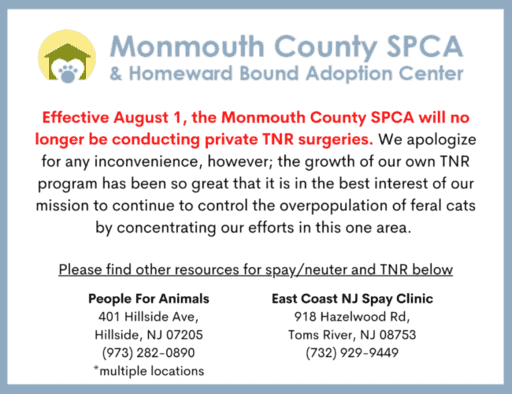
The MCSPCA has taken a leadership role in implementing a program proven to succeed in saving lives – Trap-Neuter-Return (TNR). TNR specifically addresses the burgeoning feral cat population in a humane way. Feral cats are trapped, spayed or neutered, and returned to the community to live in managed colonies. Kittens and “friendly” stray cats are put up for adoption at the MCSPCA, immediately reducing the population of ferals in the community. Grant funding and donations support the program and significantly reduces the cost to the municipality.
1. Trap-Kill is more expensive for the municipality than TNR. Currently, in order to cover our costs, the MCSPCA must charge a municipality $250 per feral cat brought in. Since TNR is funded by grants and donations, the cost to the municipality is at least cut in half.
2. There are not enough animal control resources to trap all cats in a municipality. A female cat can start having litters at 4 months old and can have four litters in one year. One mating pair can regenerate the population very quickly. With the animal control resources available it is impossible to trap every feral cat in a short enough time span to keep up with reproduction.
3. There is a “vacuum effect” where new cats fill the void due to migration from other colonies to take advantage of available food sources. With TNR, the cats are released into managed colonies with registered caregivers who are the only people allowed to feed feral cats. This stops late night “drive by” feeding by well-meaning people. The caregivers keep careful statistics on the population and most importantly, track the success of TNR.
4. Without community education, the source of the problem – people – will not change. Our TNR program includes comprehensive humane education programs to educate the community about feral cats, the importance of keeping owned cats inside, and the vital importance of spay/neuter. Education is backed up by ordinances that include steep fines for the abandonment of cats into the community.
There are many myths out there about feral cats. Feral cats cannot be “rehabilitated.” Feral cats cannot be “fenced in.” There is no farm or sanctuary that can take all the feral cats in Monmouth County.
Advantages of TNR:
1. Population is immediately reduced via adoption of kittens and “friendlies”
2. Spayed/Neutered cats roam less, don’t yowl or fight (typical mating behaviors)
3. Neutered male cats mark less often and with significantly less odor
4. Disease is reduced since the cats get vaccinated (rabies etc)
5. Fewer nuisance calls about feral cats
6. Most importantly, lives are saved!
TNR is an effective and humane way to control feral cats. TNR works because it is a multi-tiered approach. TNR humanely stops the reproductive cycle, adoptable kittens and cats are brought into the MCSPCA and not released back out, feral colonies are actually managed, and most importantly, comprehensive community education is provided to change human behavior.
The fact is these cats are out there. TNR means they are not reproducing, are disease-free, are fed and cared for and cause less trouble in the municipality. Our plan is to stabilize the population, so the colonies reduce in population through natural attrition. Together we can reach our goal to significantly decrease the feral cat population in Monmouth County over the next five years with our Community Cats Campaign. Help us save lives, support our TNR initiatives.
More information:
